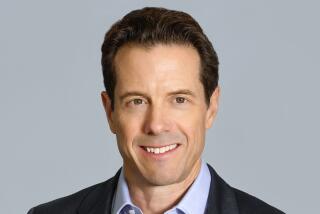EMI turning to an outsider for a new spin
Douglas Merrill remembers driving past the Capitol Records Tower at Hollywood and Vine and wishing he could stop in and look around.
Now he’s getting an office there, in the West Coast headquarters of EMI Music.
On April 28, Merrill will start his new job as president of digital business at the label that’s home to artists such as Coldplay and Norah Jones. His hire, announced last week, surprised many in the technology and music industries.
He’s a long-time technologist whose most recent job involved keeping Google Inc.’s systems running. His experience with music involves listening to it. And he couldn’t even do that when, as a child, he lost his hearing for three years.
The choice of an industry outsider to address EMI’s problems was lauded by some music industry executives and analysts as creative and risk-taking. It struck others as an act of desperation.
Merrill, 37, said he saw the move as a rare opportunity to help change an industry and create something new in a medium he loves.
“Music is so central to people,” he said in an interview. “I am super excited to be involved in helping music to figure out its next chapter.”
EMI and its peers have struggled with declining revenue, as sales of digital downloads aren’t growing fast enough to offset the decline of CD purchases. Terra Firma Capital Partners bought EMI last year for $4 billion, not including debt.
Earlier this year, the London-based music company laid off 1,500 employees, about one-fourth of its workers. EMI employs about 4,500 people today.
Merrill wouldn’t discuss the specific challenges facing EMI. But he said he planned to bring with him the experimental spirit embodied at Google. He will report directly to Guy Hands, EMI’s chairman and chief executive.
“Douglas is a proven agent of change who combines broad business intellect with a deep engineering background,” Hands said in a statement.
As a sign of his willingness to consider bold moves, Merrill held open the possibility that people sharing music online -- an illegal practice that the music industry has fought to stop through lawsuits -- might help some artists during certain parts of their career.
“Maybe a lot of the things we assume are not actually correct,” he said.
In spite of the management turmoil, EMI has recently been on the forefront of several new digital initiatives. Last May, it was the first major record company to sell music without copying protections on Apple’s iTunes store. Although EMI was not part of a joint venture announced Thursday between the other three major record companies and News Corp.’s MySpace, it is expected to join.
By hiring Merrill, EMI signaled that it was willing to shake things up, said Laura Martin, a senior media analyst at Soleil Securities.
“They are late, but this demonstrates their commitment to enter the digital world,” she said. “Merrill brings with him an innovative framework for problem-solving.”
He was Google’s chief information officer whose major projects included helping create the auction system used for the company’s 2004 initial public offering and overseeing the launch of the Google Checkout payment service.
Before joining Google in 2003, he was a senior vice president at Charles Schwab, where his responsibilities included information security. He started the information security practice at Price Waterhouse in L.A. in 1997 and ran it until 2000. He has a doctorate in psychology from Princeton University.
Merrill said his appreciation of music stems in part from the fact that he was deaf between the ages of 3 and 6, when he “lived in a world without music.”
Merrill is likely in search of “the next exponential challenge, something really hard that has never been done before,” said Yan-David Erlich, a former Google colleague and chief executive of instant messaging start-up Social.im.
For now, Merrill says he’s open to new ideas: “I don’t need to solve the problem for the industry first. I need to solve the problem for EMI. The industry will follow the leaders.”
---
jessica.guynn@latimes.com


